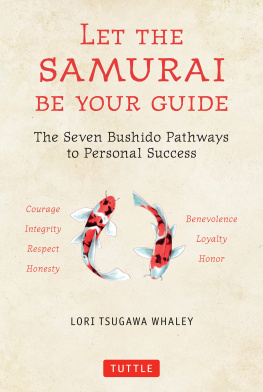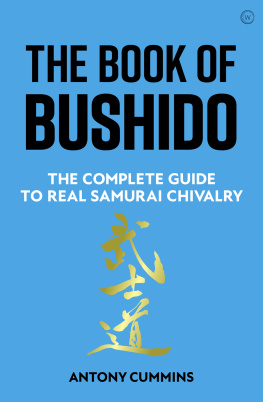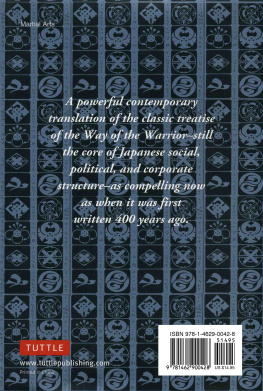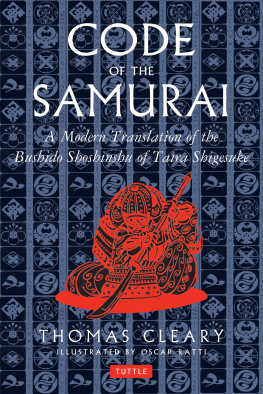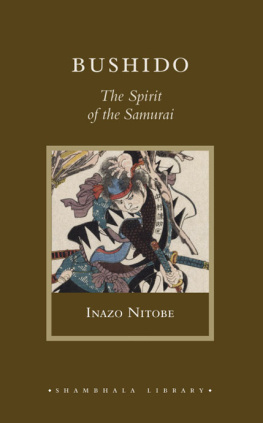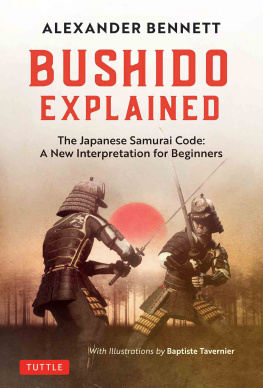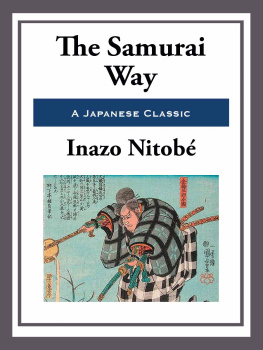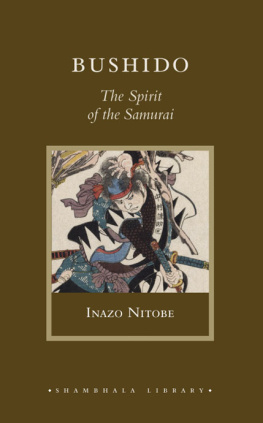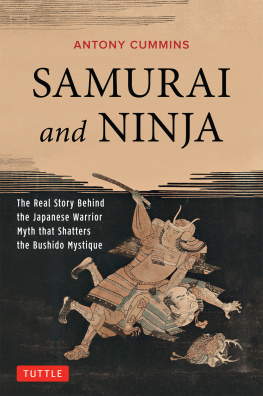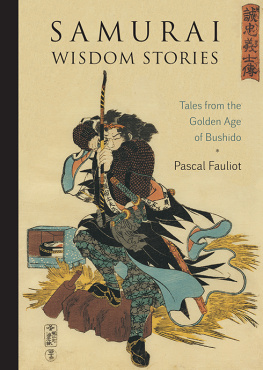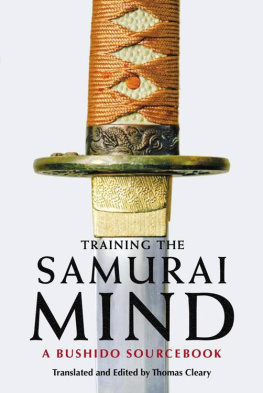Lori Tsugawa Whaley - Let the Samurai Be Your Guide: The Seven Bushido Pathways to Personal Success
Here you can read online Lori Tsugawa Whaley - Let the Samurai Be Your Guide: The Seven Bushido Pathways to Personal Success full text of the book (entire story) in english for free. Download pdf and epub, get meaning, cover and reviews about this ebook. publisher: Tuttle Publishing, genre: Religion. Description of the work, (preface) as well as reviews are available. Best literature library LitArk.com created for fans of good reading and offers a wide selection of genres:
Romance novel
Science fiction
Adventure
Detective
Science
History
Home and family
Prose
Art
Politics
Computer
Non-fiction
Religion
Business
Children
Humor
Choose a favorite category and find really read worthwhile books. Enjoy immersion in the world of imagination, feel the emotions of the characters or learn something new for yourself, make an fascinating discovery.
- Book:Let the Samurai Be Your Guide: The Seven Bushido Pathways to Personal Success
- Author:
- Publisher:Tuttle Publishing
- Genre:
- Rating:5 / 5
- Favourites:Add to favourites
- Your mark:
- 100
- 1
- 2
- 3
- 4
- 5
Let the Samurai Be Your Guide: The Seven Bushido Pathways to Personal Success: summary, description and annotation
We offer to read an annotation, description, summary or preface (depends on what the author of the book "Let the Samurai Be Your Guide: The Seven Bushido Pathways to Personal Success" wrote himself). If you haven't found the necessary information about the book — write in the comments, we will try to find it.
Let the Samurai Be Your Guide: The Seven Bushido Pathways to Personal Success — read online for free the complete book (whole text) full work
Below is the text of the book, divided by pages. System saving the place of the last page read, allows you to conveniently read the book "Let the Samurai Be Your Guide: The Seven Bushido Pathways to Personal Success" online for free, without having to search again every time where you left off. Put a bookmark, and you can go to the page where you finished reading at any time.
Font size:
Interval:
Bookmark:
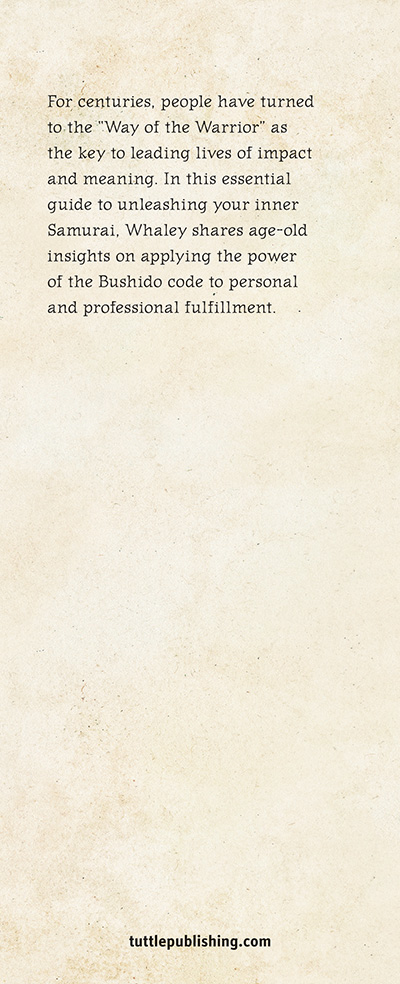
Acclaim for
Let the Samurai Be Your Guide
I appreciate in Lori Tsugawa Whaleys book, Let the Samurai Be Your Guide, her desire to ensure the legacy of my father, Chiune Sugihara, was accurately portrayed and his story will continue being told. How wonderful to see this book, and I am sure many people will enjoy reading it.
Nobuki Sugihara, son of diplomat Chiune Sugihara
Ms. Tsugawa Whaley uses stories to blend aspects of Japanese and American history and culture, and the bridging of the two cultures as Japanese American. She uses that bridge to relate the values of bushido in a context that anyone can readily understand and recognize as universally shared values.
David Inoue, MPH/MHA, executive director, Japanese American Citizen League
As a nisei, we often do not realize the implanted cultural lessons instilled by our immigrant Japanese parents. I believe it played an important role in my/our familys survival during the years of incarceration, and helped rebuild the Uwajimaya family business in the aftermath of WWII. Ms. Whaleys book illustrates how these principles have shaped the Japanese culture, and provided the driving force in affecting the Japanese American experience.
Tomio Moriguchi, chairman emeritus, Uwajimaya Inc.
Ms. Whaley writes an incredibly inspirational and impeccably wise read. I just know this book will continue to garner greater and greater exposure and praise!
Chris Brusatte, exhibit manager, Go for Broke National Education Center
In more than 36 years as a community journalist, I have met and admired many notable figures, including the wife and son of Chiune Sugihara, Michi Nishiura Weglyn, Daniel Inouye, Roy Matsumoto and many others. Now that they are gone, Im glad that Lori Tsugawa Whaley is sharing their stories and showing that they still have lessons for us today.
J.K. Yamamoto, staff writer, Rafu Shimpo; former English editor, Hokubei Mainichi
During the post-WWII occupation of Japan, my father served in the Military Intelligence Service (MIS) where he met and married my mother. Thus, my rootsand identityare planted in the two worlds of America and Japan. Lori Tsugawa Whaleys book, Let the Samurai Be Your Guide, is both an insightful exploration of samurai legacy and a heartfelt personal journey of discovery about the samurais lasting influence on Japanese culture, values and way of life.
Clarence Moriwaki, president, Bainbridge Island Japanese American Exclusion Memorial Association
The spirit of the samurai is so deeply ingrained into the Japanese character and culture that knowledge of bushido is a key to understanding modern Japan. Loris book, Let the Samurai Be Your Guide, provides valuable insights into the people and culture of this very special country.
George Yen, DTM, international president 2013-14, Toastmasters International
Let the Samurai Be Your Guide teaches the important principles of the ancient samurai as related to everyday life. Lori Tsugawa Whaley has skillfully written and woven aspects of history into the story to include the experiences of Japanese Americans who faced racism and discrimination during WWII. These were people who rose above adversity, and achieved success as they applied the ideals of the samurai.
S. Floyd Mori, former national president/CEO Japanese American Citizens League (JACL)
Ms. Whaley illustrates clearly and concisely the core principles of bushido that have helped shape Japanese social behavior for centuries. This book serves as a vivid demonstration of how those strong cultural values shaped the Japanese American experience.
Larry Greenwood, president, Japan Society of Northern California
Let the Samurai Be Your Guide reinforces the best values and principles of my Japanese American heritage. What kaizen (philosophy of continuous improvement) was in the 80s, this book and timeless message is for today.
Daniel C. Russ, JAG and private practice, lt. colonel, staff judge advocate, USAF, (retired)
Lori Tsugawa Whaleys book, Let the Samurai Be Your Guide, outlines the moral and ethical code of the samurai as a basis for life through real-life examples. By sharing their stories, she shows how Japanese culture and the spirit of the samurai warrior can manifest itself through ordinary people in todays uncertain world.
Karen Yoshitomi, executive director, Japanese Cultural & Community Center of Washington
The samurai principles carried the Japanese American community through difficult years of internment and recovery, and led the nisei soldiers of WWII to their victories in battle and great contributions to America.
Tom Graves, author of Twice Heroes: Americas Nisei Veterans of WWII and Korea
Lori Tsugawa Whaleys book, Let the Samurai Be Your Guide, describes the principles and ethics that influenced the Japanese Americans during WWII. As a World War II nisei vet, I believe it was those attributes that allowed Japanese Americans incarcerated in internment camps and those who served in the 100/442 Inf. RCT and Military Intelligent Service (MIS) to accept and accomplish their best.
Yoshiro Tokiwa, 100th/442nd veteran, Poston War Relocation Center internee

The Tsugawa family kamon (crest) is a design called ken katabami, and is a combination of the katabami plant (wood sorrel) and three stylized ken (swords). It is one of the five main crests of feudal Japan. The katabami symbolized a strong family bloodline, while the sword is symbolic of the warrior and was only used by samurai families.
D edicated to my paternal grandparents, Masaichiro and Kazuno Ishii Tsugawa, from Tokushima, Japan, and to my maternal grandparents, Kenkichi and Jun Nishiguchi Taniguchi, from Matsusaka, Japan. In the early 1900s, all of you braved the Pacific Ocean to settle in a new land in search of a better life, and you gifted me with a rich heritage.
To my parents, George and Mable Tsugawa, who taught me by example the bushido code and to do my best, try my hardest, and never give up, ganbaru! Although I did not appreciate working hard on the farm and growing up in the country until later in life, this shaped my character. Thank you for all of lifes lessons that you instilled in me.
To my traumatic brain injury (TBI) team, especially the late Dr. Vern S. Cherewatenko, who instilled hope, expert advice and was with me on this entire journey. Thank you from the bottom of my heart. I would also like to acknowledge Dr. Robert Ahn, Channa Beckman, Teri Dodson, Theodore S. Kadet, Dr. Tess Mandapat, Dr. Melissa Mercogliano and COLPT, Dr. Richard E. Seroussi, and Craig E. Taft. With utmost gratitude, I would like to thank Leonard Semenea, who demonstrated through his character and action the integrity and compassion of a samurai. Without all of you, your expertise and dedication, this book would not have been possible, and for that I am forever thankful.
To HeAri Seattle Israeli Dancing for providing excellent instruction and a space to learn and grow. A special thank you to Ellie Morhaime and Dianne Casper for being outstanding instructors and faithful leaders. Dancing was instrumental in my TBI recovery physically and mentally and I always look forward to the dance sessions.
To the God of Abraham, Isaac, and Jacob: thank you for giving me life and showering me with your love, mercy and grace.
To the samurai of pre-industrial Japan: I am thankful for your lives of courage, honor, and integrity. Also to the modern-day and future samurais who apply the samurai principles to their lives, lead by example and make this world a better place.
Next pageFont size:
Interval:
Bookmark:
Similar books «Let the Samurai Be Your Guide: The Seven Bushido Pathways to Personal Success»
Look at similar books to Let the Samurai Be Your Guide: The Seven Bushido Pathways to Personal Success. We have selected literature similar in name and meaning in the hope of providing readers with more options to find new, interesting, not yet read works.
Discussion, reviews of the book Let the Samurai Be Your Guide: The Seven Bushido Pathways to Personal Success and just readers' own opinions. Leave your comments, write what you think about the work, its meaning or the main characters. Specify what exactly you liked and what you didn't like, and why you think so.

